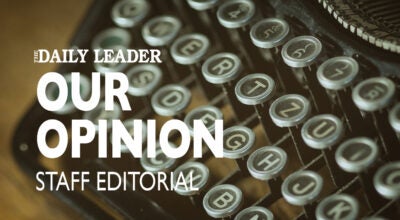MDOT funding is a ‘big problem’
Published 8:02 pm Tuesday, May 16, 2017
Rep. Becky Currie rightly said the state is about to have a “big problem” when it comes to funding for infrastructure needs.
Currie was talking about the Legislature’s attempt to find ways to fund road and bridge improvements during a special session next month.
Currie serves on a committee that created a “Top 10” list of ways to generate the money, which House Speaker Philip Gunn whittled down to a seven-point plan. He shared that with Lt. Gov. Tate Reeves and Gov. Phil Bryant.
“So far we have not heard back,” Currie said.
“We’re really walking a thin line of getting anything done,” Currie said. “We’ve got to do something and we’re not even doing what we normally do. We want to get something in it so we can get started on the roads and bridges.”
Currie is right that the state will have a problem if extra funding for the Mississippi Department of Transportation isn’t approved.
But the list of ways the Legislature is hoping to generate that extra funding leaves much to be desired.
The committee’s best option, and Currie’s favorite, is a Local Option Fuel Tax. Through this option, local governments will be allowed to put to a referendum a local fuel tax to be collected and used by the local government for road and bridge repair and maintenance.
It’s doubtful that voters anywhere will choose to increase fuel taxes, no matter how necessary an increase might be. People, generally speaking, will not vote for a measure that takes money from them.
“But if people vote it down then they can’t complain about their roads,” Currie said.
This option is short-sighted. It’s the Legislature’s way of avoiding raising taxes at the state level, which most Republicans are vehemently against. Instead, it passes that buck down to the local level.
The Legislature sometimes has to make tough decisions that might be unpopular. Increasing the fuel tax at the state level is potentially one of them. By passing the tax increase to local governments, lawmakers are not doing what is best for the state, they are doing what is best for their re-election chances.


